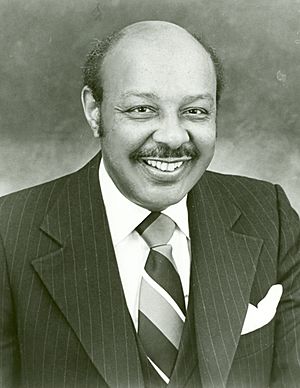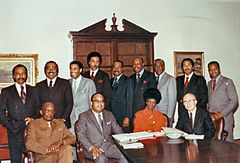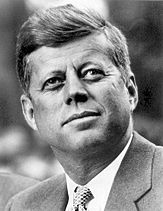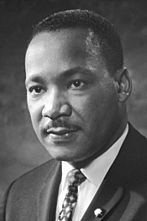Louis Stokes facts for kids
Quick facts for kids
Louis Stokes
|
|
|---|---|
 |
|
| Member of the U.S. House of Representatives from Ohio |
|
| In office January 3, 1969 – January 3, 1999 |
|
| Preceded by | Charles Vanik |
| Succeeded by | Stephanie Tubbs Jones |
| Constituency | 21st district (1969–93) 11th district (1993–99) |
| Chair of House Ethics Committee | |
| In office January 3, 1991 – January 3, 1993 |
|
| Preceded by | Julian C. Dixon |
| Succeeded by | Jim McDermott |
| In office January 3, 1981 – January 3, 1985 |
|
| Preceded by | Charles Bennett |
| Succeeded by | Julian C. Dixon |
| Chair of House Intelligence Committee | |
| In office January 3, 1987 – January 3, 1989 |
|
| Preceded by | Lee H. Hamilton |
| Succeeded by | Anthony Beilenson |
| Personal details | |
| Born | February 23, 1925 Cleveland, Ohio, U.S. |
| Died | August 18, 2015 (aged 90) Cleveland, Ohio, U.S. |
| Political party | Democratic |
| Spouse | Jeannette "Jay" Stokes |
| Children | 4 |
| Relatives | Carl Stokes (Brother) |
| Education | Case Western Reserve University Cleveland State University (JD) |
| Military service | |
| Allegiance | |
| Branch/service | |
| Years of service | 1943–1946 |
| Battles/wars | World War II |
Louis Stokes (born February 23, 1925 – died August 18, 2015) was an important American lawyer, a leader in civil rights, and a politician. He served for 30 years in the United States House of Representatives, which is part of the U.S. Congress. He represented the east side of Cleveland, Ohio. Louis Stokes was the first African American person elected to Congress from the state of Ohio. He also led important committees, including the House Intelligence Committee, and was a leader of the Congressional Black Caucus. He was also the first African American on the House Appropriations Committee, which decides how government money is spent.
Contents
Early Life and Education
Louis Stokes was born in Cleveland, Ohio. His parents were Louise and Charles Stokes. He and his brother, Carl Stokes, grew up in the Outhwaite Homes. This was one of the first housing projects built with government money.
Louis went to Central High School. After high school, he joined the U.S. Army and served from 1943 to 1946 during World War II. When he returned, he used the G.I. Bill to go to college. The G.I. Bill helped soldiers pay for their education. He studied at Western Reserve University and Cleveland-Marshall College of Law.
In 1953, Louis Stokes started his law practice in Cleveland. He worked on many important cases. One famous case he argued before the U.S. Supreme Court in 1968 was about police rules for stopping and searching people. Later that year, he was elected to the House of Representatives. He represented Cleveland's 21st District. After 1992, his district changed to the 11th District, but it still covered much of the same area. He retired from Congress in 1999 after serving for 30 years.
A Career in Congress
During his time in the House of Representatives, Louis Stokes worked on the House Appropriations Committee. This committee is very important because it decides how the government spends its money. He used his position to help bring money and resources to Cleveland.
Louis Stokes cared a lot about veterans, who are people who have served in the military. He helped get money for health care centers for veterans in Cleveland.
In the 1970s, Louis Stokes led the House Select Committee on Assassinations. This committee was tasked with investigating the murders of President John F. Kennedy and civil rights leader Martin Luther King Jr.. He also served on a House committee that looked into a big government issue called the Iran-Contra Affair.
As the leader of the House Ethics Committee, Louis Stokes made sure that politicians followed the rules and acted honestly. He oversaw an investigation into a situation where some politicians were accused of wrongdoing. A U.S. Attorney named Steven Dettelbach said that Louis Stokes was a "shining beacon of integrity" during that time.
In 1971, Louis Stokes was one of the people who helped start the Congressional Black Caucus. This group is made up of African American members of the U.S. Congress. They work together to address issues important to Black communities.

In 1992, Louis Stokes ran for president as a "favorite son" candidate from Ohio. This means he ran to gain support from his home state. He won the delegates from his district in Ohio.
After leaving Congress, Louis Stokes became a special professor at Case Western Reserve University. He continued to teach and inspire students until he passed away.
Family Life
Louis Stokes had four children. His daughter, Angela, was a judge in Cleveland. Another daughter, Lori Stokes, is a well-known TV news anchor. His son, Chuck, is also a journalist.
Louis Stokes' brother, Carl Stokes, made history as the first African American mayor of a major American city. Louis Stokes was also a cousin of the famous musician Rick James.
Louis Stokes was a member of the Prince Hall Freemasons and the Kappa Alpha Psi fraternity.
Later Life and Passing
Louis Stokes retired from his law firm in 2012. On July 20, 2015, it was announced that he was battling cancer. He passed away on August 18, 2015, at his home in Cleveland, at the age of 90. He was buried at Lake View Cemetery in Cleveland.
Legacy and Honors
Louis Stokes left a lasting impact, and many places and programs are named in his honor:
- The Cuyahoga Metropolitan Housing Authority opened the Louis Stokes Museum in 2007. It shows items, videos, and stories about his life.
- The Western Reserve Historical Society had an exhibit called "Carl and Louis Stokes: From the Projects to Politics." It showed their journey from humble beginnings to important political roles.
- He was inducted into the Karamu House Hall of Fame in 2007 for his contributions to the community.
- Many buildings are named after him, including:
* Howard University's medical library. * An expansion of the Cleveland Public Library's main building. * The GCRTA's Windermere train station, now called Louis Stokes Station at Windermere. * The Veteran's hospital in Cleveland, now the Louis Stokes Cleveland Department of Veteran Affairs Medical Center. * Building 50 on the campus of the National Institutes of Health, called the Louis Stokes Laboratories.
- Case Western Reserve University, his alma mater, offers the Louis Stokes Congressional Black Caucus Foundation Scholarship. This scholarship helps students who might face economic or educational challenges get a college education.
Autobiography
- Louis Stokes with David Chanoff (2016): The Gentleman from Ohio. (Foreword by Congressman John Lewis). Trillium Books, The Ohio State University Press. ISBN: 978-0-8142-1312-4
See also
 In Spanish: Louis Stokes para niños
In Spanish: Louis Stokes para niños
- List of African-American United States representatives
- List of Cleveland–Marshall College of Law alumni
 | Charles R. Drew |
 | Benjamin Banneker |
 | Jane C. Wright |
 | Roger Arliner Young |



